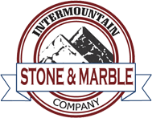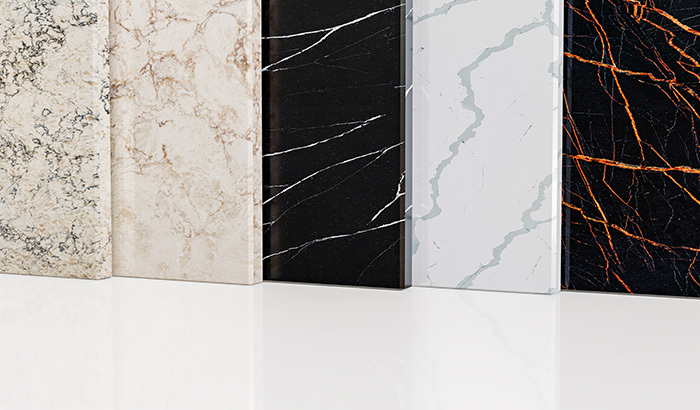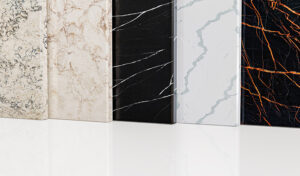Today we’re looking at one of the greatest counter material face-offs and diving into the pros and cons of each: granite vs. quartz countertops. Which is it going to be?
Few things are as luxurious and timeless as stone counters in your home or business. But finding the right material that meets your wants and needs can feel overwhelming!
Granite and quartz slabs are among the most popular kitchen and bathroom countertops options. Each has its own advantages, disadvantages, pros, and cons.
So which material should you go with? Continue scrolling to find out.
Granite vs. Quartz Countertops
Before diving into the ultimate battle, let’s do a mini-lesson on each of these materials to ensure we’re all on the page.
Quartz Counters — Quartz is an engineered stone often used for countertop surfaces. They combine the best of natural stone with modern manufacturing processes. Quartz countertops are made by combining roughly 90% loose quartz, and the remaining ~10% are resins and pigments.
Granite Counters — Unlike quartz, granite is an entirely natural stone mined directly from stone quarries. It is then cut into slabs, polished or honed (or finished in another way), and fabricated into countertops.
Granite vs. Quartz Countertops: Which is Better?
Granite vs. quartz countertops is one of the biggest battles and controversies in the home interior and design world. Quartz and granite countertops are arguably the most popular countertop materials on the market today. But which reigns supreme? Many homeowners disagree about which is the premium surface for residential and commercial applications.
While quartz and granite countertops are similar in some ways, there are many differences between the two. Here’s a quick breakdown of each:
Pros of Quartz Countertops
Here are a few benefits that quartz offers that granite cannot:
Unmatched Durability: Quartz is naturally nonporous, unlike natural stones, like granite. Because of its nonporous nature, it is more resistant to stains and bacteria buildup. It is also more resistant to cracking and chipping.
Extremely Low-Maintenance: One of the biggest perks of quartz countertops is that they do not require any maintenance like marble or granite. Outside of regular cleaning, you won’t need to do anything special to care for your quartz counters.
Appearance: Quartz mimics the look of a natural stone but is a bit more uniform in its appearance. When homeowners choose this material, there is a broader selection of design options in terms of colors and patterns.
Cons of Quartz Countertops
Here are a couple of disadvantages of quartz counters:
An Engineered Stone: The fact that quartz counters are not natural stone is only considered to be a “con” to some homeowners. Some homeowners are set on wanting a natural stone on their property. Quartz is manufactured – not the real deal.
More Heat Sensitive: Because of the resin found in quartz counters, it does not hold up as well to extreme heat because of its resin content. Quartz countertops are best used indoors since outdoor kitchens are subject to extreme temperatures.
Pros of Granite Countertops
There are some areas where quartz counters fall short. Here are some of the benefits of granite:
Natural Material: Some people prefer granite over quartz because it is a natural stone.
Heat Resistant: Granite can withstand high temperatures. After all, it is an igneous rock — also called magmatic rock — which means that it forms through the cooling and solidifying of magma.
You could place a hot pan right on top of it without causing severe damage (though many homeowners still opt for trivets). Granite is often used for outdoor kitchen countertops because it can tolerate exposure to the sun and UV rays.
Versatile Look and Aesthetic: Granite comes in various colors and patterns. Each slab is unique and one-of-a-kind.
Cons of Granite Countertops
Granite is a great countertop option, but it’s important to note its disadvantages:
Required Maintenance: Granite is porous and requires periodic maintenance, such as sealing. You can do this task yourself, but a professional will do it more effectively and efficiently.
Carbon Footprint: A lot of energy is used to harvest granite from the earth. Moreover, slabs imported from other countries leave a larger carbon footprint.
Irregular Design: If your design requires complete uniformity, granite countertops may not be your best choice. Granite is a natural stone, so no two slabs are the same.
Granite vs. Quartz Countertops: Where They Tie
In other aspects, quartz and granite are neck and neck:
Real Estate Value: Quartz and granite are superior countertop materials and sure to impress prospective buyers. Compared with other types of counters, especially ones like ceramic tile or laminate, both granite and quartz can improve the real estate value of your property.
Comparable Costs: When it comes to granite and quartz countertops, the costs are very comparable. Both of these materials are high-quality and, because of that, neither is much more expensive than the other. The prices of each will vary from one slab to the next. Make sure to research and find a company that offers quality options at a reasonable price.
Granite vs. Quartz Countertops — Intermountain Stone & Marble Can Help!
Granite vs. quartz countertops is a face-off we love to dissect. But if you’re still not sure which route you should go for the countertops in your home or business, the professionals at Intermountain Stone & Marble in Salt Lake City are here to help!
Our team of experts is invested in your project and is here to help you find the best option for your kitchen and bathroom countertop needs. We are dedicated to providing you with a fantastic experience by offering the best customer service and high-quality materials, like granite, marble, quartz, and other luxurious stones, at a reasonable price that fits within your budget.
We are ready to serve those in Salt Lake City, Park City, and surrounding areas in Utah. Contact our knowledgeable team to check out our extensive style and color selection and get your quote today.


